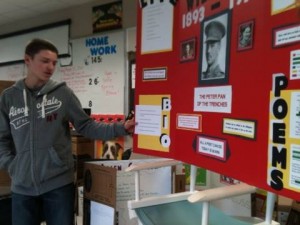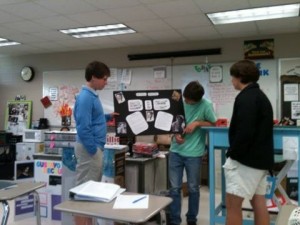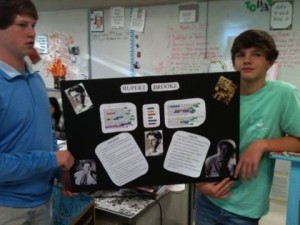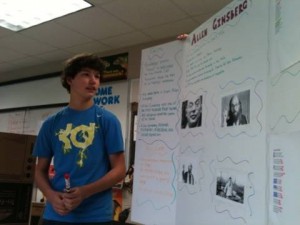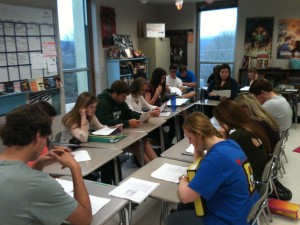January 2025 M T W T F S S 1 2 3 4 5 6 7 8 9 10 11 12 13 14 15 16 17 18 19 20 21 22 23 24 25 26 27 28 29 30 31 "A Worn Path" by Welty
A Raisin in the Sun
- "All of it" scene: Mr. Linder visits
- "Ocean Liner" scene
- "Thank You Walter" scene
- "This is Business" scene
- A Raisin in the Sun Text
- A Raisin in the Sun: Introduction
- Interview between Mike Wallace and Lorraine Hansberry
- Soundtrack for A Raisin in the Sun
- Trailer for A Raisin in the Sun (Spoilers…)
- Video: 10 minutes About Lorraine Hansberry
- Video: Introduction to A Raisin in the Sun (Some Spoilers)
- Watch After the Play
Academic Vocabulary to Know
ACT Practice
- ACT English Practice Tests
- ACT English: Adverb and Adjective Review
- ACT English: Apostrophe Video
- ACT English: Colons and Semicolon Review Video
- ACT English: Gerunds and Possessive Case of Pronouns
- ACT English: How to Identify the Issue video
- ACT English: Misplaced Modifiers Video
- ACT English: Pronoun Usage
- ACT English: Who, Whom, That, Which, Where (Relative Pronouns) Video
- ACT Exam Practice Tests–write your answers down and compare them to the answer key
- ACT Reading Passage Practice
- ACT Student—Sample Test
- Chomp Chomp–English ACT prep
- Explore English Test for ACT–pdf with answers at bottom
- Inside the ACT: Getting to Know the ACT
- MH Practice Plus Act Prep–GREAT VIDEOS TO HELP YOU!!! Use headphones if you view these in library
- Practice ACT Test
Books Online!
College Essay Tips
Creative Writing
- 10 Talks from Authors—Ted Talks
- 13 Inspirational TED Talks for Writers
- A Year's Worth of Pictures to Write About
- Free Writing Prompts
- How to Avoid VERY words
- http://www.everypoet.net/element/display.php?symbol=Mo
- Instead of using LOOK use…
- Periodic Table Poetry Ideas
- Playwriting: Creating a character
- Plot Point Generator
- Poetry Prompts
- Prose Prompts
- Random Character Generator
- Random Scenario Generator
- Raymond Carver: Short Story and Poetry Writer Chapter 1
- Said is Dead
- Story Title Generator
- Touchy Feely Words/Imagery
- Words to Describe Someone's Voice
- Writing Prompts for August
- Writing Prompts for January
- Writing Prompts for June
- Writing Prompts for March
- Writing Prompts for May
- Writing Prompts for November
- Writing Prompts for September
Death of a Salesman
Historical Documents
Links You Can Use!
- 60 Second Recap 3: Themes
- Adjective, Adverb, and Noun Clauses Video
- Concrete Nouns
- http://learning.blogs.nytimes.com/tag/text-to-text/
- Phrases and Clauses Shmoop
- Prepositions Video (Schoolhouse Rock)
- Text to Text: Real Life Connections to Novels and Plays We Read
- Tony Hawk: Do What You Love
- Video of
- What are claims and counterclaims?
Night Links
- Introduction to Night–60 Second Recap Lady
- Night: Context Analysis
- Night: Final Analysis
- Night: Motifs
- Night: Plot Summary and Analysis–Watch when finished with novel
- Night: Summary Overview–Watch before you begin
- Night: Symbols
- Night: Theme 1
- Night: Theme 2
- Night's Characters by 60 Second Recap Lady
Nonfiction
Of Mice and Men
- Audio of Gary Sinese Reading Of Mice and Men
- Audio of Of Mice and Men
- Of Mice and Men Video Summary by Sparknotes
- Of Mice and Men: Characters
- Of Mice and Men: Extra Credit
- Of Mice and Men: George (Don't watch it until you are done. Spoilers.)
- Of Mice and Men: In Conclusion
- Of Mice and Men: Message
- Of Mice and Men: Motifs
- Of Mice and Men: Setting
- Of Mice and Men: Symbols
- Of Mice and Men: The Plot–All found in chapter 1! (Watch after chapter 1)
- Of Mice and Men: Themes
Research Help
Shelby County Schools Related
Short Stories Online
Teacher Links...
Tennessee Williams
The Crucible
- From Farm Boy to Fearmonger: Senator McCarthy Video
- LeRoy High Hysteria: Dr. Drew Video
- Mass Hysteria—Girls at LeRoy High Video 1
- Overview of The Crucible
- The Crucible Characters
- The Crucible: Context
- The Crucible: Final Analysis
- The Crucible: John Proctor
- The Crucible: Motifs
- The Crucible: Plot
- The Crucible: Theme 1: Hysteria
- The Crucible: Theme 2: Guilt
The Great Gatsby Links
- 60 Second Recap 1: The Overview
- 60 Second Recap 10: Protagonist
- 60 Second Recap 2: Symbol 1–The Valley of Ashes
- 60 Second Recap 3: Themes
- 60 Second Recap 5: Plot
- 60 Second Recap 6: Overview and Analysis
- 60 Second Recap 8: Characters
- 60 Second Recap 9: Final Analysis:
- 60 Second Recapt 7: Symbol 2–TJ Eckleberg
- An Index to The Great Gatsby
- Audio of The Great Gatsby
- Chapter 1 of The Great Gatsby
- Chapter 2 of The Great Gatsby
- Chapter 3 of The Great Gatsby
- Chapter 4 of The Great Gatsby
- Chapter 5 in The Great Gatsby
- Chapter 6 of The Great Gatsby
- Chapter 7 of The Great Gatsby
- Chapter 8 of The Great Gatsby
- Chapter 9 of The Great Gatsby
- Crashcourse Pt 1: The Great Gatsby
- Fads of the 1920s
- Great Gatsby Poem
- The Great Gatsby ELL
- The Great Gatsby Music
- The Great Gatsby Online!
- Video of the Setting of The Great Gatsby
- Vocabulary for 1
- Vocabulary for 2-3
- Vocabulary for 4-5 The Great Gatsby
- Vocabulary for 6-7 The Great Gatsby
- Vocabulary for 8-9 The Great Gatsby
- What was it like to live in the 1920s?
The Lottery
Their Eyes Were Watching God
Categories
- A Raisin in the Sun (4)
- ACT (12)
- American Dream (25)
- Animal Farm (4)
- Art Connection (6)
- Beginning of the Year (8)
- Calendar (13)
- Carl Sandburg (1)
- Creative Writing (15)
- Debate (4)
- Eureka (1)
- Fahrenheit 451 (3)
- First Semester (2)
- Generation Gap Unit-11th grade (6)
- Google Classroom (1)
- Great Expectations (41)
- History Connection (4)
- Justice Theme–First Nine Weeks (2)
- Lesson Plans for 11th Grade (18)
- Lit Circles (1)
- Night (4)
- No Red Ink (2)
- Of Mice and Men (5)
- Photos (40)
- Poetry (11)
- Poetry Portfolio Project (30)
- Reading What We Want to Read (8)
- Romeo and Juliet (18)
- Science Connection (1)
- Short Story Unit (26)
- Teacher Stuff (1)
- The Crucible (7)
- The Glass Menagerie (1)
- The Great Gatsby (18)
- The Odyssey (5)
- Their Eyes Were Watching God (11)
- Third Night Weeks (2)
- To Kill a Mockingbird (26)
- Tuesdays with Morrie–11th (1)
- Twelve Angry Men (6)
- Uncategorized (313)
- Vocabulary (12)
- Writing (24)
Archives
- November 2017 (1)
- May 2017 (1)
- March 2017 (1)
- January 2017 (1)
- October 2016 (3)
- September 2016 (4)
- August 2016 (2)
- May 2016 (4)
- April 2016 (9)
- March 2016 (20)
- February 2016 (4)
- January 2016 (8)
- December 2015 (2)
- November 2015 (6)
- October 2015 (13)
- September 2015 (13)
- August 2015 (7)
- June 2015 (1)
- May 2015 (3)
- April 2015 (9)
- March 2015 (8)
- February 2015 (12)
- January 2015 (10)
- December 2014 (7)
- November 2014 (8)
- October 2014 (15)
- September 2014 (20)
- August 2014 (8)
- June 2014 (1)
- May 2014 (1)
- April 2014 (7)
- March 2014 (7)
- February 2014 (1)
- January 2014 (3)
- December 2013 (2)
- October 2013 (3)
- September 2013 (5)
- August 2013 (3)
- June 2013 (1)
- May 2013 (3)
- April 2013 (7)
- March 2013 (2)
- February 2013 (4)
- January 2013 (11)
- December 2012 (11)
- November 2012 (11)
- October 2012 (18)
- September 2012 (12)
- August 2012 (9)
- May 2012 (4)
- April 2012 (1)
- March 2012 (1)
- February 2012 (4)
- January 2012 (5)
- December 2011 (6)
- November 2011 (11)
- October 2011 (13)
- September 2011 (12)
- August 2011 (10)
- July 2011 (2)
- May 2011 (2)
- April 2011 (11)
- March 2011 (9)
- February 2011 (25)
- January 2011 (21)
- December 2010 (9)
- November 2010 (15)
- October 2010 (28)
- September 2010 (22)
- August 2010 (11)
- July 2010 (1)
- June 2010 (1)
- May 2010 (10)
- April 2010 (10)
- March 2010 (9)
Meta
If you were on band trip
You DO get extra time to turn in your poetry project (9th) and essay (11th).
Posted in Uncategorized
Leave a comment
Reminder about poetry project due tomorrow
- Have Works Cited page on BACK of poster. Should have at least 3 sources. Remember what we talked about in class—double spaced, hanging indentions, Times New Roman, size 12, alphabetical order (Check MLA/Owl at Purdue——>link on right).
- You can use a poster board OR triboard.
- Need at least one photo of your poet. More would be nice.
- Information about the poet’s career highlights. 5 to 7 facts. Bulletpoint format is fine.
- Information about the poet’s life—what did you think was interesting? Five to seven facts. Bulletpoint format is fine.
- 2 of the poet’s poems
- Analyze the poems. You can use the highlight method or the insert shape text option.
- Jazz it up with something eye catching! 🙂 You’ve seen examples in the library of good ones and well…some that could have been better. 😉
- See you tomorrow with your project!
Here are some links to project board ideas…some may spark your interest.
Posted in Uncategorized
Leave a comment
Plans for 11th grade classes: Week of March 17-March 21, 2014
Monday, March 17——-Advanced 11:
- Bellringer 1: How would you define “Generation Gap”? How do generation gaps cause conflict within families, communities, and societies?
- Explain the fourth 9 weeks focus. Anticipation Guide for Generation Gap/Decisions Affecting Others (#1 in folder)
- Students will write down the following words and define them (not cutting and pasting them, but writing them in their own handwriting), underlining OR highlighting the vocabulary words:
- Aesthetic Impact, Comedic resolution,Tragic resolution, Quantitative,Qualitative, Cohesive, Coherent, Authoritative sources, Formal language, Informal language, Generation gap (Use your literature book index for the definition for most of these.)
Advanced 11:
- Bellringer 2: What old saying/quote/adage does your mom or dad or someone else older than you say often? Do you agree with this saying/quote/adage? Why or why not?
- “Mending Wall” by Robert Frost, page 872-873. Literary Analysis: Pastoral poems, blank verse
- Mending Wall powerpoint
- Complete the 3 questions after “Mending Wall” in complete sentences.
Wednesday, March 19, 2014
Advanced 11th:
- Bell ringer 3: Describe an important moment you shared with a parent, grandparent, or a guardian. What were you doing? What did you talk about? What were you thinking about? How do you feel about this moment now?
- Review questions about “Mending Wall.” Put questions in their folder. (#2 in folder)
- Read Rita Dove’s “Adolescence III” after reading Rita Dove’s biographical information (page 1417)
- Turn your bell ringer for today into a poem, using a similar style to Rita Dove’s in “Adolescence III.” Put this poem in your folder as #3. Impress me and type it as well ( if possible.)
Thursday, March 20, 2014
Advanced 11th:
- Bell ringer 4: Think about a time when you visited a relative or friend of the family whose way of living was very different from your own. Describe the housing of this person. Describe any meal you had there, and what things surprised you, upset you, scared you, etc. If you cannot think of any time this has happened, write about an imaginary relative or friend of the family.
- Relate my experience with my Grandma D and her way of life/memories of her home and how I still dream of that place/share quilt she made.
- Short story: Alice Walker and “Everyday Use.” Page 1310 in literature book. Literary analysis: characterization, dialect. Write down vocabulary in your folder (from page 1310). #4 in folder
- Questions that follow on pages 1320-1321. On page 1320, do 1-3 and make sure you cite textual evidence to support your responses. On page 1321, do 1-10 and answer questions in complete sentences. #5 in folder
Friday, March 21, 2014
Adv. 11:
1.Bellringer 5: What was the most interesting thing that you discovered during your time researching this last writing project? OR what skill did you improve upon during this last writing project?
2. Read cases aloud. Let them use the laptop/projector to find a photo of the person/event they are discussing.
3. If time, discuss the short story/narrative they will write in the upcoming weeks. Have them buy Tuesdays With Morrie over the break. Remind them that we have a class set of A Raisin in the Sun.
Next Week’s Plans for 9th Grade Classes
Monday, March 17, 2014
1. DRP Week 24, Monday
2.Literature Textbook: Page 606-611 Close Read: Poetic Language and Meaning
3. Check on their progress on poet project; give help where needed
Tuesday, March 18, 2014
- DRP Week 24, Tuesday
- Works Cited Help
- Have students copy down the language of the learner words for this new 9 weeks and define. Page one in your new folder. Explain the theme of the 9 weeks. “How do values define society?” (With heavy empasis on dystopian novels/stories.)
Language of the Learner words:
Dystopia, propaganda, informational text, allegory,satire, rhetoric, logical fallacies, claim, support, summary, paraphrase, cite, parenthetical citation, sources, plagiarism, integrating information, research, media literacy, formal speech, academic language
Wednesday, March 19, 2014
- DRP, Wed Week 24
- Work in classroom on your poet project. Bring all materials you need.
- Supervise and help as needed.
Thursday, March 20, 2014
- DRP, Thursday, Week 24
- I’ll be giving you what would have been your benchmark for last 9 weeks, but this will count 50 pts for effort and results will be used to check on skills that may need to be worked on. When finished, read quietly or work on project. Due tomorrow.
Friday, March 21, 201
1. DRP, Friday, Week 24 2. Display projects and share with class/quick presentation
Posted in Uncategorized
Leave a comment
Words to Define–9th grade, 3rd 9 Weeks
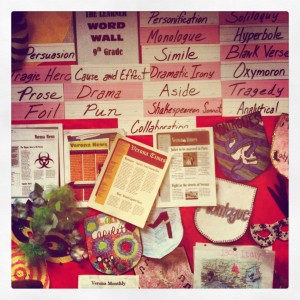 All 9th grade classes, define these words and it must be done in your handwriting. No copy and pasting from the internet. 🙂
All 9th grade classes, define these words and it must be done in your handwriting. No copy and pasting from the internet. 🙂
Persuasion, Tragic Hero, Prose, Foil, Cause and Effect, Drama, Pun,
Iambic Pentameter,
Personification, Monologue, Simile, Dramatic Irony, Aside,
Shakespearean Sonnet, Collaboration, Metaphor, Soliloquy,
Hyperbole, blank verse, oxymoron, tragedy, analytical
Posted in Romeo and Juliet
Leave a comment
Shelby County Curriculum Guide, 9th Grade
3rd 9 Weeks Unit Overview: Students will read Romeo and Juliet or a work with similar themes. In addition, students will read and analyze short stories, poems, historical documents, and informational texts in relation to the theme of human relationships. Students will also write an analytical essay analyzing the use of language in order to convey emotions and characterize relationships.
Writing Focus: Analytical
Unit: Human Relationships and Consequences
| ESSENTIAL QUESTION(S): How are human relationships developed and how can they change?
Analyze how complex characters (e.g., those with multiple or conflicting motivations) develop over the course of a text, interact with other characters, and advance the plot or develop the theme. [RL.9-10.3] Determine the meaning of words and phrases as they are used in the text, including figurative and connotative meanings; analyze the cumulative impact of specific word choices on meaning and tone (e.g., how the language evokes a sense of time and place; how it sets a formal or informal tone). [RL.9-10.4] Analyze the representation of a subject or a key scene in two different artistic mediums, including what is emphasized or absent in each treatment (e.g., Auden’s ―Muse des Beaux Arts‖ and Breughel’s Landscape with the Fall of Icarus). [RL.9-10.7] Analyze how an author draws on and transforms source material in a specific work (e.g., how Shakespeare treats a theme or topic from Ovid or the Bible or how a later author draws on a play by Shakespeare). [RL.9-10.9] Analyze how the author unfolds an analysis or series of ideas or events, including the order in which the points are made, how they are introduced and developed, and the connections that are drawn between them. [RI.9-10.3] Initiate and participate effectively in a range of collaborative discussions (one-on-one, in groups, and teacher-led) with diverse partners on Grade 9 topics, texts, and issues, building on others’ ideas and expressing their own clearly and persuasively. [SL.9-10.1] Determine or clarify the meaning of unknown and multiple-meaning words and phrases based on Grade 9 reading and content, choosing flexibly from a range of strategies. [L.9-10.4] Demonstrate understanding of figurative language, word relationships, and nuances in word meanings. [L.9-10.5]
|
Posted in Uncategorized
Leave a comment
Shelby County Curriculum Guide, 11th grade, 3rd 9 Weeks
Unit Philosophy:
As eleventh graders near voting eligibility, it is critical that students begin to question the origin of their values and beliefs and evaluate how they will develop their own moral compass. Furthermore, students must begin to assess their involvement within society and the need to be citizens of the world.
Unit:Authority and Government Suggested Time Frame: 3rd 9 weeks
ESSENTIAL QUESTION(S):1. When must an individual challenge societal expectations? 2. To what extent does a governing body have the right to dictate morality? 3. Why and how do religion, politics, and persecution interact?LITERARY TEXTS The Crucible by Arthur Miller,Twelve Angry Men by Reginald Rose, *If time Death of a Salesman by Arthur Miller (We have all of these plays in our classroom/literature book. No need to purchase.)
|
Posted in Uncategorized
Leave a comment
Remind 101 reminder…:)
If you are a parent or 9th grade student interested in getting easy reminders/updates about what is going on in class and about due dates, please follow these directions:
To receive messages via text, text @culver9
to (772) 261-2092. You
can opt-out of messages at anytime
by replying, ‘unsubscribe @culver9’.
11th grade students or parents of 11th grade students, you have a different one:
To receive messages via text, text @culver11
to (772) 261-2092. You
can opt-out of messages at anytime
by replying, ‘unsubscribe
@culver11′.
Posted in Uncategorized
Leave a comment

